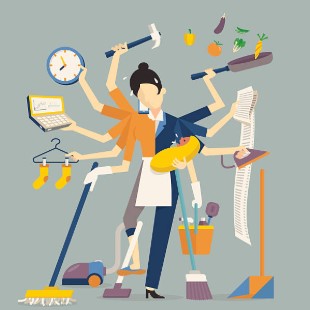It’s time to take off the cape.
The world will be just fine, trust me.
As women, we nurture many relationships: a mother, a wife, a daughter, a sister, a friend, a co-worker. Not to mention the many roles we play: a cook, a cleaner, a secretary, a chauffer, etc. We sometimes feel pressure to “do it all” and wind up simply feeling exhausted.
And no wonder; imagine for a moment that all the roles you play in a day were name badges stuck to your clothes. You’d be covered head to toe!
Before you pull your hair out, realize you don’t have to be superwoman all the time. It’s ok to take off the cape and take some time for yourself.
Are you suffering from Superwoman Syndrome?
According to the National Institute of Mental Health, women and men often develop most of the same mental disorders and conditions, but may experience very different symptoms. Women tend to report:
- Persistent sadness or feelings of hopelessness
- Abuse of alcohol and/or drugs
- Dramatic changes in eating or sleeping habits
- Appetite and/or weight changes
- Decreased energy or fatigue
- Excessive fear or worry
- Seeing or hearing things that are not there
- Extremely high and low moods
- Aches, headaches, or digestive problems without a clear cause
- Irritability
- Social withdrawal
- Thoughts of suicide
Facts about Women’s Issues:
Based on the recent information from the National Center for Health Statistics (NCHS) :
- Across their lifetime, 1 in 3 women, around 736 million, are subjected to physical or sexual violence by an intimate partner or sexual violence from a non-partner – a number that has remained largely unchanged over the past decade.
- Women are twice as likely as men (12 percent of women compared to 6 percent of men) to suffer from depression.
- Although men and women are affected equally by such mental health conditions as obsessive-compulsive disorder and social phobias, women are twice as likely as men to have panic disorder, generalized anxiety, and specific phobias.
- Women are twice as likely to develop PTSD following a traumatic event.
- Women account for at least 85 percent of all anorexia and bulimia cases and 65 percent of binge-eating disorder cases.
If you are feeling anxious, depressed, or overwhelmed, reach out to us at Peaceful Summit Counseling
There’s a path that’s best for you, and we can help you find it.



